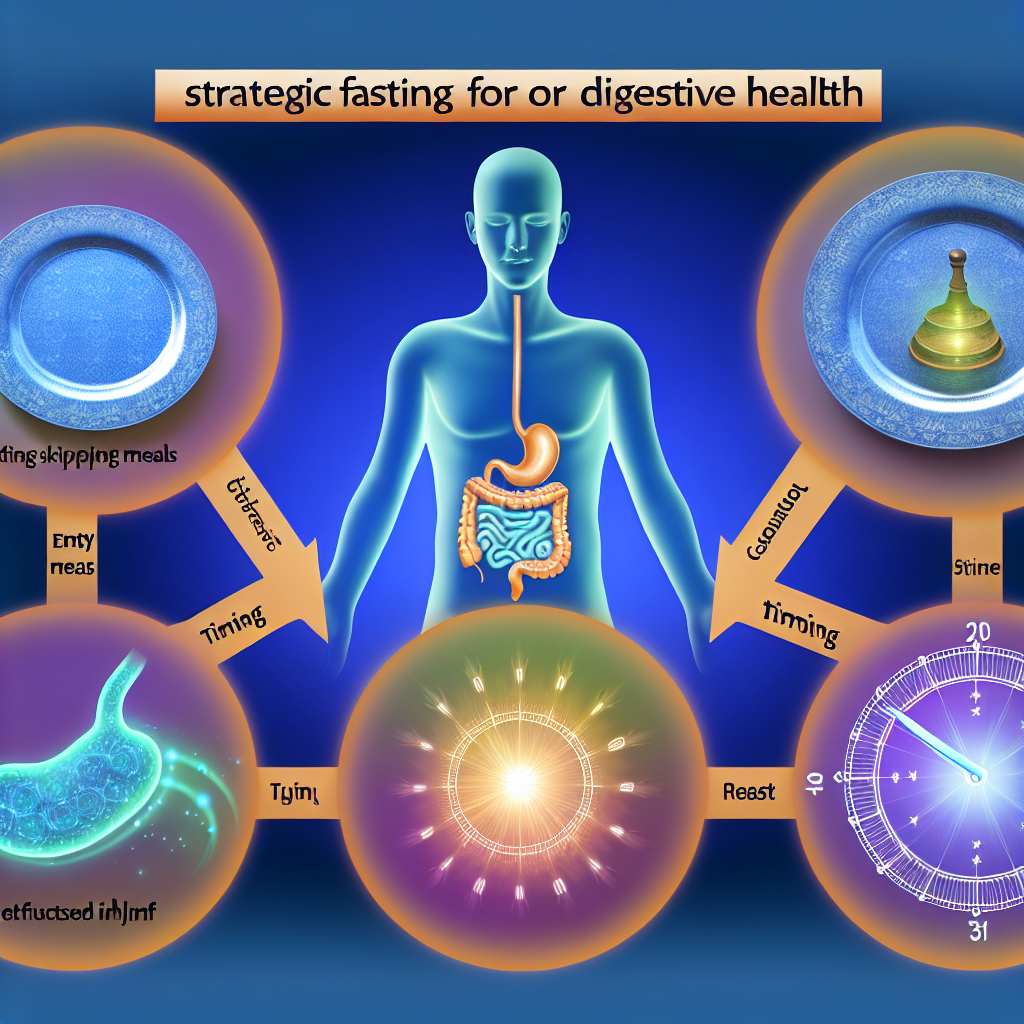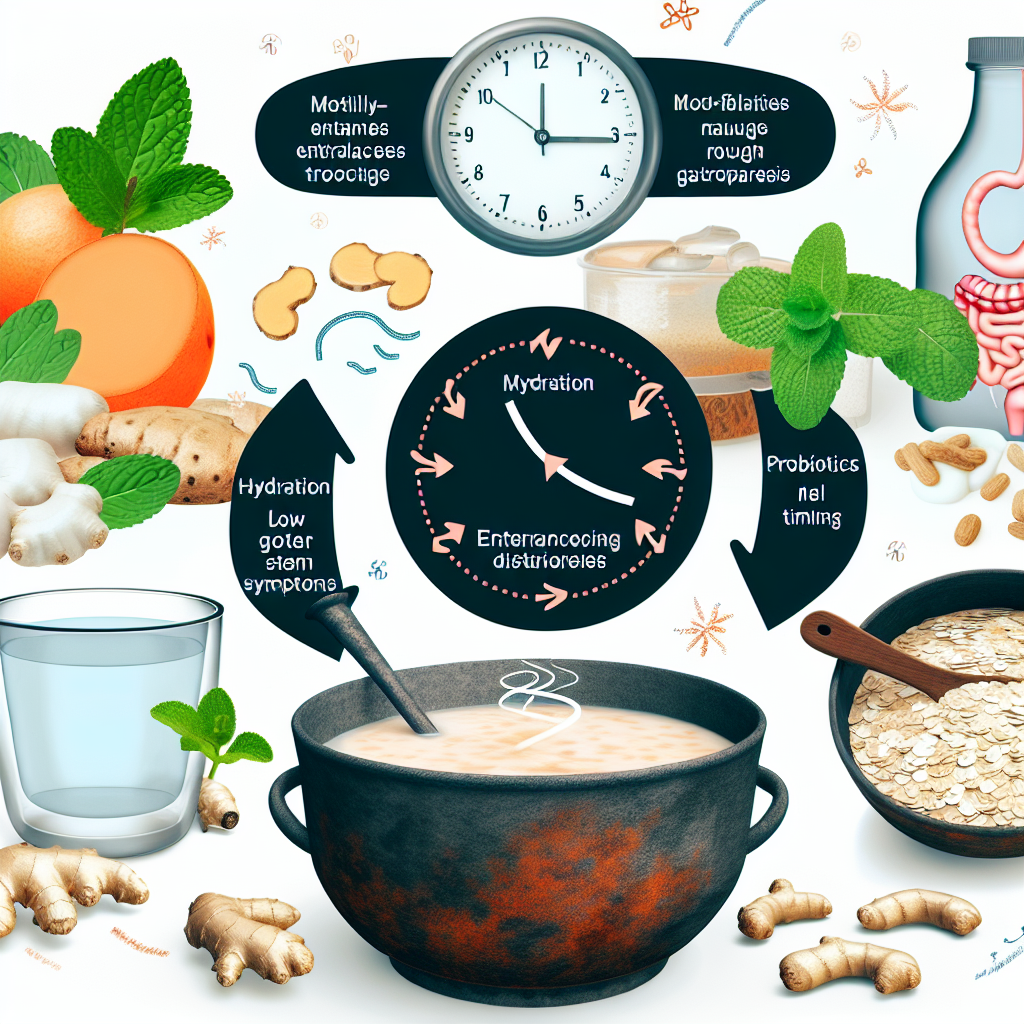Strategic Fasting: Digestive Rest Protocols for Gut Inflammation
Introduction: The Link Between Gut Health and Overall Well-Being
Gut health is the foundation of overall well-being, influencing immunity, mental clarity, and metabolic function. Unfortunately, modern diets filled with processed foods, excessive sugar, and inflammatory ingredients contribute to chronic gut issues such as bloating, leaky gut syndrome, and irritable bowel syndrome (IBS). One emerging solution to combat gut inflammation naturally is strategic fasting—a scientifically backed approach that allows the digestive system to rest, heal, and regenerate.
Fasting has been practiced for centuries, often for religious or spiritual reasons, but modern research suggests that structured fasting periods play an essential role in gut healing. When we eat continuously, our digestive system is constantly working, processing food particles, breaking down macronutrients, and managing microbial balance in the gut. This constant activity leaves little time for cellular repair and detoxification processes, leading to increased inflammation and gastrointestinal discomfort. Strategic fasting offers a reset by reducing digestive burden and promoting microbiome balance.
Strategic fasting can take several forms, including intermittent fasting (IF), prolonged fasting, or modified fasting plans that integrate gut-friendly nutrients. These protocols encourage autophagy, a cellular regeneration process that helps remove damaged cells, enhances immune function, and supports gut barrier integrity. Studies show that fasting also reduces inflammatory markers such as C-reactive protein (CRP) and improves gut microbiota diversity, two critical factors in digestive health.
For those struggling with gut inflammation, common symptoms such as bloating, indigestion, and excessive gas can be signs that their digestive system needs a break. By strategically implementing fasting protocols, individuals can experience reduced inflammation, improved digestion, and enhanced nutrient absorption.
In this article, we will explore professional and medical studies supporting fasting for gut health, discuss different fasting approaches, and identify best practices to implement fasting as a natural strategy to restore digestive wellness.
Medical Evidence: How Fasting Supports Gut Health
Several clinical studies have highlighted the role of fasting in improving gut health and reducing inflammation. One notable study published in Cell Metabolism found that fasting stimulates autophagy, a self-cleaning process where the body eliminates dysfunctional or damaged cells, allowing for tissue repair ([Yoshinori Ohsumi, 2016](https://doi.org/10.1016/j.cmet.2016.10.055)). This mechanism is particularly beneficial for the gut lining, which can deteriorate due to chronic inflammation, leading to conditions such as leaky gut syndrome.
Additionally, research in Nature Communications suggests that intermittent fasting influences gut microbiota composition, increasing beneficial bacteria while reducing inflammatory microbes ([Zarrinpar et al., 2018](https://doi.org/10.1038/s41467-018-06830-2)). This shift in the microbiome plays an essential role in regulating immune responses and decreasing gut permeability. A balanced microbiome is crucial for producing short-chain fatty acids (SCFAs), which aid in reducing gut inflammation and promoting healing.
Another significant study, published in World Journal of Gastroenterology, examined how time-restricted eating (a form of intermittent fasting) influenced gut permeability and inflammation markers. The findings indicated that individuals who practiced time-restricted feeding experienced reduced levels of systemic inflammation, evidenced by lower tumor necrosis factor-alpha (TNF-α) and interleukin-6 (IL-6), both of which are associated with digestive disorders such as Crohn’s disease and ulcerative colitis ([Meng et al., 2020](https://doi.org/10.3748/wjg.v26.i44.6820)).
Beyond inflammation control, fasting promotes gut motility and enhances the production of digestive enzymes, making nutrient absorption more efficient. Fasting also stimulates the migrating motor complex (MMC), a wave-like mechanism that clears undigested food and bacteria from the intestines, preventing bacterial overgrowth and fermentation-related bloating. Research from American Journal of Clinical Nutrition supports the role of fasting in increasing MMC activity, which can alleviate symptoms of irritable bowel syndrome ([Sturm & Manko, 2018](https://doi.org/10.1093/ajcn/nqx155)).
How to Implement Strategic Fasting for Gut Healing
When approaching fasting as a tool for gut health, it’s essential to ease into it gradually. Medical professionals recommend beginning with short fasting periods (12–16 hours) and advancing to longer fasts (24–48 hours) based on individual tolerance and health conditions.
Here are some practical fasting protocols to consider:
– Intermittent Fasting (IF) (12-16 hours): This allows the gut to rest overnight, improving gut bacterial balance and reducing inflammation.
– Time-Restricted Eating (TRE) (16-18 hours): Extending the fasting period can further stimulate autophagy and enhance gut lining repair.
– 24-Hour Fasting (Once or Twice per Week): This method provides a more significant reset to the digestive system, amplifying autophagy and microbiome balance.
– Modified Fasting (Including Bone Broth and Herbal Teas): For those who struggle with extended fasts, consuming gut-friendly liquids can aid healing while providing essential nutrients.
Additionally, supporting the gut with probiotic-rich foods, herbal teas, and collagen-rich bone broth during non-fasting periods can further enhance its healing effects. Staying hydrated with mineral-rich water is also crucial to prevent dehydration and electrolyte imbalances.
Conclusion: A Natural Way to Heal Your Gut
Strategic fasting provides a natural, scientifically supported approach to reducing gut inflammation and promoting digestive health. By allowing the digestive system to rest, individuals can enhance microbiome balance, decrease inflammatory markers, and improve overall gut function. Clinical research continues to uncover fasting’s benefits for conditions such as leaky gut syndrome, IBS, and inflammatory bowel disease, making it a vital tool for those seeking alternative healing methods.
As with any dietary change, individuals should consult with healthcare professionals before implementing fasting protocols, particularly if they have preexisting medical conditions. With thoughtful planning, strategic fasting can serve as an effective, natural protocol for restoring gut health, reducing inflammation, and fostering overall well-being.
References
– [Yoshinori Ohsumi. “Autophagy: Cellular Recycling Process and Its Role in Health.” *Cell Metabolism*, 2016.](https://doi.org/10.1016/j.cmet.2016.10.055)
– [Zarrinpar, A. et al. “Intermittent Fasting and Gut Microbiota Dynamics.” *Nature Communications*, 2018.](https://doi.org/10.1038/s41467-018-06830-2)
– [Meng, J. et al. “Time-Restricted Feeding and Its Role in Gut Barrier Integrity.” *World Journal of Gastroenterology*, 2020.](https://doi.org/10.3748/wjg.v26.i44.6820)
– [Sturm, A. & Manko, A. “Fasting and Gut Motility: Migrating Motor Complex Stimulation.” *American Journal of Clinical Nutrition*, 2018.](https://doi.org/10.1093/ajcn/nqx155)
Summary:
Strategic fasting is a natural and scientifically-backed approach to reducing gut inflammation and promoting digestive health. By allowing the digestive system to rest, individuals can enhance microbiome balance, decrease inflammatory markers, and improve overall gut function. Clinical research has shown the benefits of fasting for conditions like leaky gut syndrome, IBS, and inflammatory bowel disease. With proper implementation and guidance from healthcare professionals, strategic fasting can serve as an effective protocol for restoring gut health and fostering overall well-being.

Dominic E. is a passionate filmmaker navigating the exciting intersection of art and science. By day, he delves into the complexities of the human body as a full-time medical writer, meticulously translating intricate medical concepts into accessible and engaging narratives. By night, he explores the boundless realm of cinematic storytelling, crafting narratives that evoke emotion and challenge perspectives.
Film Student and Full-time Medical Writer for ContentVendor.com




